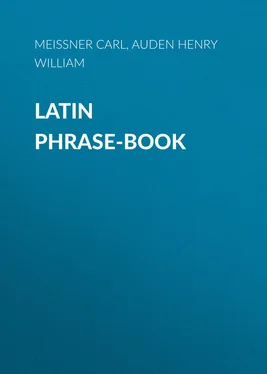Carl Meissner - Latin Phrase-Book
Здесь есть возможность читать онлайн «Carl Meissner - Latin Phrase-Book» — ознакомительный отрывок электронной книги совершенно бесплатно, а после прочтения отрывка купить полную версию. В некоторых случаях можно слушать аудио, скачать через торрент в формате fb2 и присутствует краткое содержание. Жанр: foreign_antique, foreign_prose, на латинском языке. Описание произведения, (предисловие) а так же отзывы посетителей доступны на портале библиотеки ЛибКат.
- Название:Latin Phrase-Book
- Автор:
- Жанр:
- Год:неизвестен
- ISBN:нет данных
- Рейтинг книги:5 / 5. Голосов: 1
-
Избранное:Добавить в избранное
- Отзывы:
-
Ваша оценка:
- 100
- 1
- 2
- 3
- 4
- 5
Latin Phrase-Book: краткое содержание, описание и аннотация
Предлагаем к чтению аннотацию, описание, краткое содержание или предисловие (зависит от того, что написал сам автор книги «Latin Phrase-Book»). Если вы не нашли необходимую информацию о книге — напишите в комментариях, мы постараемся отыскать её.
Latin Phrase-Book — читать онлайн ознакомительный отрывок
Ниже представлен текст книги, разбитый по страницам. Система сохранения места последней прочитанной страницы, позволяет с удобством читать онлайн бесплатно книгу «Latin Phrase-Book», без необходимости каждый раз заново искать на чём Вы остановились. Поставьте закладку, и сможете в любой момент перейти на страницу, на которой закончили чтение.
Интервал:
Закладка:
causae rerum et consecutiones – cause and effect.
causae extrinsecus allatae (opp. in ipsa re positae ) – extraneous causes.
rerum causae aliae ex aliis nexae – concatenation, interdependence of causes.
ex parvis saepe magnarum rerum momenta pendent – important results are often produced by trivial causes.
ex aliqua re nasci, manare – to originate in, arise from.
ab aliqua re proficisci – to originate in, arise from.
ex aliqua re redundare ( in or ad aliquid ) – to accrue in great abundance.
utilitas efflorescit ex aliqua re – untold advantages arise from a thing.
e fontibus haurire (opp. rivulos consectari or fontes non videre ) – to draw from the fountain-head.
haec ex eodem fonte fluunt, manant – these things have the same origin.
fons et caput ( vid. sect. III., note caput… ) – source, origin.
4. Regard – Importance – Influence – Power – Inclination
rationem habere alicuius rei – to have regard for; take into consideration.
respicere 60 60 But respicere ad aliquid (aliquem) = to look round at an object.
aliquid – to have regard for; take into consideration.
quo in genere – from this point of view; similarly.
multis rebus or locis – in many respects; in many points.
in utraque re – in both cases; whichever way you look at it.
ceteris rebus (not cetera ) – as regards the rest; otherwise.
omni ex parte; in omni genere; omnibus rebus – from every point of view; looked at in every light.
aliqua ex parte – to a certain extent.
aliquatenus – to a certain extent.
magni (nullius) momenti esse – to be of great (no) importance.
momentum afferre ad aliquid – to determine the issue of; to turn the scale.
pertinere ad aliquid – to be essentially important to a thing.
hoc nihil ad sapientem pertinet – a wise man is in no way affected by this.
hoc in sapientem non cadit – it is incompatible with the nature of a wise man; the wise are superior to such things.
multum valere ad aliquid – to contribute much towards…; to affect considerably; to be instrumental in…
multum afferre ad aliquid – to contribute much towards…; to affect considerably; to be instrumental in…
magnam vim habere ad aliquid – to have considerable influence on a question.
positum, situm esse in aliqua re – to depend upon a thing.
contineri aliqua re 61 61 contineri aliqua re also means (1) to be bounded by… e.g. oceano ; (2) to be limited, restricted to, e.g. moenibus .
– to depend upon a thing.
consistere in aliqua re – to depend upon a thing.
pendēre ex aliqua re – to depend upon a thing.
in te omnia sunt – everything depends on you.
in ea re omnia vertuntur – all depends on this; this is the decisive point.
constare ex aliqua re – to be composed of; to consist of.
cernitur (in) aliqua re (not ex aliqua re ) – it is evident from…
in manu, in potestate alicuius situm, positum esse – to be in a person's power.
penes aliquem esse – to be in a person's power.
res integra 62 62 The proper meaning of integer ( in-TAG, tango ) is untouched, unsullied.
est – the matter is still undecided; it is an open question.
res mihi integra est – I have not yet committed myself.
mihi non est integrum, ut… – it is no longer in my power.
integrum (causam integram) sibi reservare – to leave the question open; to refuse to commit oneself.
penes te arbitrium huius rei est – the decision of the question rests with you.
arbitrio alicuius omnia permittere – to put the matter entirely in some one's hands.
omnium rerum arbitrium alicui permittere – to put the matter entirely in some one's hands.
arbitratu, arbitrio tuo – just as you wish.
5. Opportunity – Possibility – Occasion – Chance
occasio datur, offertur – a favourable 63 63 Not occasio opportuna, bona, pulchra , the notion "favourable" being contained in the word itself. We find, however, occasio praeclara, ampla, tanta , not unfrequently.
opportunity presents itself.
occasione data, oblata – when occasion offers; as opportunity occurs.
per occasionem – when occasion offers; as opportunity occurs.
quotienscunque occasio oblata est; omnibus locis – on every occasion; at every opportunity.
occasionem alicui dare, praebere alicuius rei or ad aliquid faciendum – to give a man the opportunity of doing a thing.
facultatem alicui dare alicuius rei or ut possit… – to give a man the opportunity of doing a thing.
potestatem, 64 64 Notice potestatem alicui pugnandi facere , to offer battle, and potestatem sui facere alicui , (1) to give opportunity of battle, and also (2) to grant an audience to (cf. sui conveniendi potestatem facere ).
copiam alicui dare, facere with Gen. gerund. – to give a man the opportunity of doing a thing.
occasionem nancisci – to get, meet with, a favourable opportunity.
occasione uti – to make use of, avail oneself of an opportunity.
occasionem praetermittere, amittere (through carelessness), omittere (deliberately), dimittere (through indifference) – to lose, let slip an opportunity.
occasioni deesse 65 65 In the same way deesse officio , to leave one's duties undone; d. muneri , to neglect the claims of one's vocation; d. rei publicae , to be careless of state interests, to be unpatriotic; d. sibi , not to do one's best.
– to neglect an opportunity.
occasionem arripere – to seize an opportunity.
facultatem, potestatem alicui eripere, adimere – to deprive a man of the chance of doing a thing.
nulla est facultas alicuius rei – no opportunity of carrying out an object presents itself.
locum dare suspicioni – to give ground for suspicion.
ansas dare ad reprehendum, reprehensionis – to give occasion for blame; to challenge criticism.
ansam habere reprehensionis – to contain, afford matter for criticism.
adduci aliqua re ( ad aliquid or ut… ) – to be induced by a consideration.
nescio quo casu (with Indic.) – by some chance or other.
temere et fortuito; forte (et) temere – quite accidentally, fortuitously.
6. Success – Good Fortune
fortuna secunda uti – to be fortunate, lucky.
fortunae favore or prospero flatu fortunae uti ( vid. sect. VI. 8., note uti… ) – to be favoured by Fortune; to bask in Fortune's smiles.
fortunam fautricem nancisci – to be favoured by Fortune; to bask in Fortune's smiles.
fortuna caecos homines efficit, animos occaecat – Fortune makes men shortsighted, infatuates them.
fortunam tentare, experiri – to try one's luck.
fortunam periclitari (periculum facere) – to run a risk; to tempt Providence.
Читать дальшеИнтервал:
Закладка:
Похожие книги на «Latin Phrase-Book»
Представляем Вашему вниманию похожие книги на «Latin Phrase-Book» списком для выбора. Мы отобрали схожую по названию и смыслу литературу в надежде предоставить читателям больше вариантов отыскать новые, интересные, ещё непрочитанные произведения.
Обсуждение, отзывы о книге «Latin Phrase-Book» и просто собственные мнения читателей. Оставьте ваши комментарии, напишите, что Вы думаете о произведении, его смысле или главных героях. Укажите что конкретно понравилось, а что нет, и почему Вы так считаете.

![Рис Хьюз - Madonna Park[e-book - рассказы]](/books/94285/ris-hyuz-madonna-park-e-book-rasskazy-thumb.webp)










